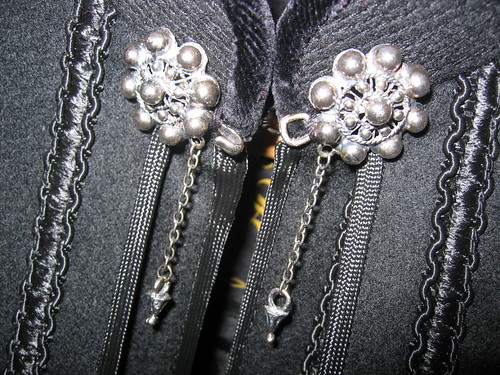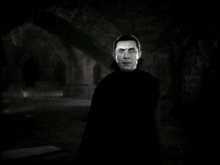I am currently considering to ask my tailor to help me with an opera cape because Sweden is a country where white Tie matters almost always include rain, wind or snow.
My question for you my gentlemen is divided into several parts:
- I am under the impression that the cloth should be wool with a silk lining? Is that the common opinion amongst you?
- I would like to have pictures of elegant opera cape, is there anyone who could help me with and my tailor?
- Fastenings? Any ideas? I have seen the tied-string-method but I don't fancy it. In military capes (old parade uniforms) there is a chain connecting the sides. Does this ring a bell for anyone? Pictures of the fastening of the chain to the cloth would really do my day.
//Dr Bob
Opera Cape
-
Edward Bainbridge
- Posts: 106
- Joined: Tue Jun 08, 2010 1:31 pm
- Contact:
If it is more a matter of protection against the weather than of style, you might have a look at Inverness capes - in a less bulky black cloth, the impression is quite different from the one with brighter, patterned thick tweeds. But you probably made up your mind, and what's wrong with an opera cape? 
That sounds really interesting. Is it known worldwide?
My tailor asked me if I wanted (I don't know the correct term) an extra piece of cloth covering just the shoulders (in Sweden we call it a "dok"). And gentlemen, do I?
My tailor asked me if I wanted (I don't know the correct term) an extra piece of cloth covering just the shoulders (in Sweden we call it a "dok"). And gentlemen, do I?
-
storeynicholas
I don't know how widely known Thornton is but it is a reliable source for patterns and cutting in England. There are several editions (Minster Press) around the turn of the 20th Century but it is seldom seen for sale. However, the great libraries have it and, probably, for the sake of such a project, one of the old tailoring houses on Savile Row would help out a colleague in another country with scans.
NJS
NJS
Dr. Bob,
I'm sure that NJS gives the best advice regarding Thornton. There are also some AA illustrations of opera capes in Tutee's evening dress posts, I believe. Just to follow up though, you should know that Simon A's illustration with the shoulder capelet is a classic capa española from Seseña in Madrid. It dates in this form from the late 19th century but the basic design is much older; it is still worn occasionally as a classic of national dress. Here's a photo of Don Jaime Marichalar wearing one during the day:

It fastens with a traditional embossed silver clasp:

For comparison, here is the current U.S. Army dress blue cape, which closes with a frog. General officers wear dark blue lining as shown here, other officers wear lining color corresponding to their service branch: cavalry, infantry, artillery, etc. This has no capelet but a velvet-faced ghillie-style collar which can be turned up though I suspect seldom is (I don't know what regulations have to say about this). You'll note that unlike the capa española, which is a single full circle of cloth, the army dress cape is seamed and less voluminous for a crisper effect:

This means that the cape cannot be pulled around and thrown over the shoulder to give a double-breasted wrap over the chest, as a full-circle cape can--a gesture probably most associated with Bela Lugosi's portrayal of Count Dracula . . . :



I'm sure that NJS gives the best advice regarding Thornton. There are also some AA illustrations of opera capes in Tutee's evening dress posts, I believe. Just to follow up though, you should know that Simon A's illustration with the shoulder capelet is a classic capa española from Seseña in Madrid. It dates in this form from the late 19th century but the basic design is much older; it is still worn occasionally as a classic of national dress. Here's a photo of Don Jaime Marichalar wearing one during the day:

It fastens with a traditional embossed silver clasp:

For comparison, here is the current U.S. Army dress blue cape, which closes with a frog. General officers wear dark blue lining as shown here, other officers wear lining color corresponding to their service branch: cavalry, infantry, artillery, etc. This has no capelet but a velvet-faced ghillie-style collar which can be turned up though I suspect seldom is (I don't know what regulations have to say about this). You'll note that unlike the capa española, which is a single full circle of cloth, the army dress cape is seamed and less voluminous for a crisper effect:

This means that the cape cannot be pulled around and thrown over the shoulder to give a double-breasted wrap over the chest, as a full-circle cape can--a gesture probably most associated with Bela Lugosi's portrayal of Count Dracula . . . :


-
- Information
-
Who is online
Users browsing this forum: No registered users and 35 guests

